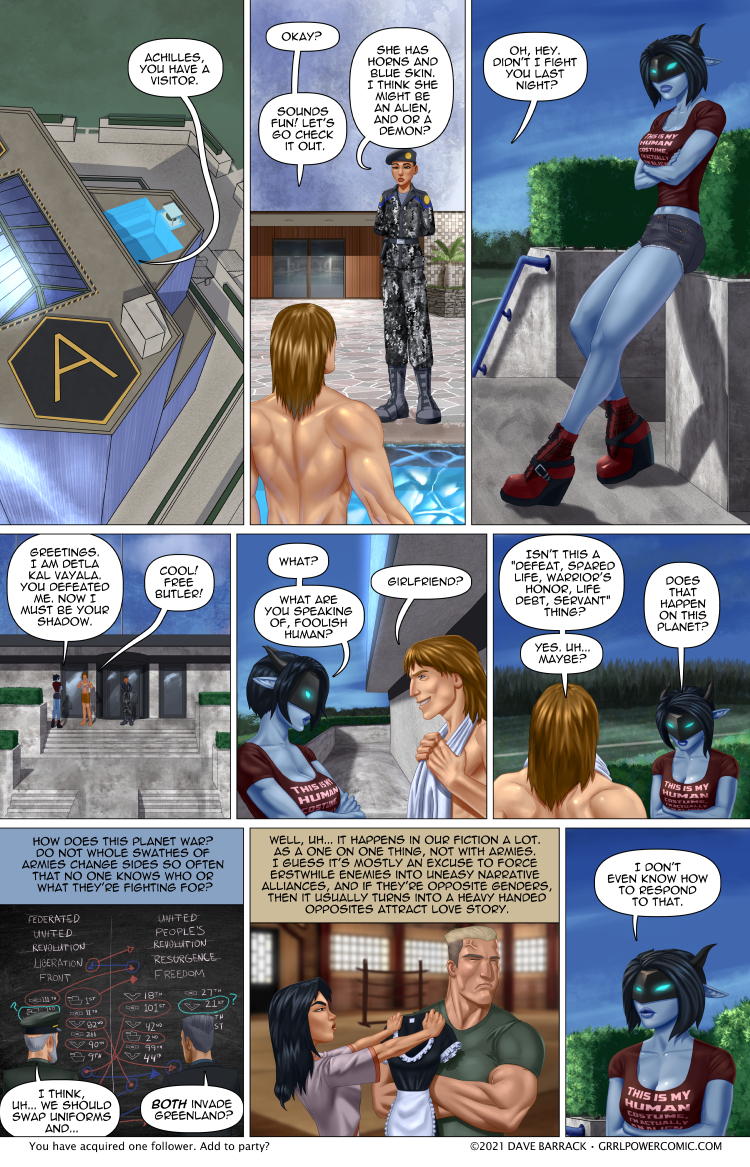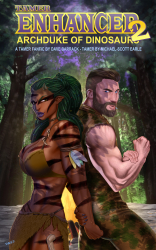Grrl Power #934 – Space butler!
I’m sure a few of you are like “Uh, didn’t she get arrested?” It comes up on the next page.
The whole “You spared and/or saved my life, therefore you own my life and/or I must serve you” seems like one of those things that has only ever existed in fiction. I don’t know, maybe it happened in Japan back in the day, but it probably almost always involves someone of lower status giving up slightly more of their autonomy to someone who already above them in the hierarchy.
“Honor” may start off as a legitimate code of conduct, but it’s incredibly easy to twist. It’s simple to say any given action is or is not honorable to justify any other action. The system breaks down the instant it becomes dishonorable or against the rules to question superiors, because people abuse power, and as soon as your superior decides its honorable for you to give him half of your Hostess Snowball (as some sort of “tribute” I guess) then your Honorgarchy is basically doomed.
Klingons are supposedly big into honor, but it’s been established that they’ll shoot up a ship, then cloak and lay in wait for someone to come along to try and rescue any crew, because “There is nothing more honorable than victory.” Well, as soon as something like that is established, then you may as well not even pretend to have honor. Irradiating a population to sterilize them means you’ll eventually achieve victory over them, as would poisoning their food supply, or stealing their atmosphere or inventing a King’s Man style “rabies beam” so they all just kill each other.
I’m not suggesting there’s no value in the concept of honor. I just can’t think of an example in any fiction I’ve consumed, from James Clavell’s Shogun to Klingons to the Nordar in Star Justice where it wasn’t a very fluid target and wildly abused or flat out ignored by those with power.
If you missed the kickstarter for Tamer 7, the e-book is available for purchase.
The new vote incentive is up! I tried something different this month – instead of doing one well painted picture with a bunch of dress variants, I wanted to tell a bit of a story. Hopefully it makes sense without any dialog or sound effects. So, instead of one picture, you guys are getting nine. Well, you are over at Patreon. The vote incentive is just the first one. And yes, Pixel is bendy enough to do a full on T&A pose.
Double res version will be posted over at Patreon. Feel free to contribute as much as you like!

















Of course Achilles goes out side with out a shirt on.
I mean strictly speaking with his powers he really only NEEDS to wear a speedo and thats only cause of law stating “no public displays of genitals”
I notice the panels are not showing his bottom half…
(except panel 4)
Obviously he briefly put on trunks then immediately took them off afterwards during the talk of ‘girlfriend.’
Whoops, completely missed that.
:)
I absolutely love Achilles. Nothing phases him, he takes nothing seriously.
Having him on the same team as Max, without him having Sydney’s ‘Get out of Jail because She amuses Max’ (which may well be Sydney’s true power) has me wondering if she didn’t break him, just a little, during his enlistment stage.
And now I’m wondering if is invulnerability would resist Dabbler’s Energy Drain Through Sex powers.
I think Achilles just gets bored a lot so he’s adopted a very ‘go-with-the-flow’ attitude to life, especially useful since he might very well be immortal depending on how his ‘complete and utterly aggravating invulnerability’ works.
It’s a serious question. If nothing else, we should consider this: the human psyche is not equipped, literally, to handle immortality. At a bare minimum, he is at serious risk of eventually losing his ability to empathize with other, mortal beings. You can only bury so many friends, so many ideals, so many loved ones…so many children, before something either breaks, or dies, inside you.
OSP did a fantastic short on this:
https://youtu.be/HpBOSAoTego
I came up with a similar idea before for people who were born mortal but were turned immortal, a sort of step by step impact on the psyche including the “oh no I am so bored what do I do with eternity” which I feel is really more how an ephemeral mind imagines an immortal or eternal mind would work, when really that is a product of survival instincts and the need to forage, hunt, keep a look out for predators, ect…that being idol is bad so the mind has a negative response which the sapient mind over thinks. but something naturally immortal or eternal simply would have no need for this thought process so doesn’t have it, so no *immortality sucks because I am bored looking for things to do*, instead a completely alien mindset where some eternal beings could literally stop moving for centuries until something happens, or they want to keep busy only because of an interest or curiosity. A more at peace with eternity outlook, or its just not as negative to look for something fun, not a “I do this because I am bored” bur rather “I do this because i enjoy it”.
that orange/blue inhuman mindset of fae, demons, and gods.
on the born mortal part though it seems a few stages of “pretender” may occur where the person is acting more on how they think an immortal should be like, ranging from the first few months to the first few decades; until the actual passage of time kicks in. The mind should stay young and more pliable so no crystalized logic, and more energetic, so, so long as they don’t cut themselves off from the entire world for too long wanting to brood in some mansion or whatever for a few decades the ephemeral mind in an immortal body should avoid future shock and go with the flow a little better, but there is bound to be that moment of “I am how old?” the introspective period where they compare their own age, how much and how little of the world has changed and look back at past centuries before they were born in a new light at just how little time has really passed between so called major events. and start to feel old despite themselves because of how short everyone’s memories seem to be in society.
that stage we can call “Old man in a young man’s body”, the I am immortal hell yeah period is over and the mind is back to thinking more human.
however we imagine the brain not made to live so long can have a mental break down and “re-wiring” point where they truly stop being human, somewhere between 150-500 years an “Immortality Syndrome” point where they have a psychotic breakdown, periods of amnesia, feral behavior, that comes and goes as the brain is reworking under the strain and depending on the type of immortality either is shifting to adapt to the new time frame, or just breaks down as the type of immortal was never really meant to survive that long anyway *like so many kinds of undead with a hundred easy kill weaknesses*, the point to either evolve, adapt, ascend, or plummet into madness.
I would imagine terraforming planets would keep you interested for a long time.
(Oh noes, the rabbits are out of control again!)
that seems to become the go to for the really old ones, I was inspired by the video games and stories with these millions of years old androids are controlling the terraforming and bio-sphere of planets.
My own seven celestial empresses have long debates when they reformat a planet as each of them created their own form of magic, and the debates are on which if any will be installed, which, and even which combination of them may be installed as the magical system for that planet. Seeing how each world evolves either on its own, with different combinations of introduced magical elements, and even selected for special species or existing species altered into specific evolutionary paths to become a local variant (humanoids, dragons, and various magical beings).
It does keep one busy to be a planetary care taker, especially if you bring your family along. The young ones can get carried away sometimes.
I mean, how would we know how the human brain would cope with immortality?
It’s not like we’ve got any examples to work with.
:V
no but we can examine the chemical differences between an elderly mind and a youthful one, compare to the neurology of animals with negligible senescence *granted they are simple organisms by comparison* and decode some potential health benefits and risks relative to if the body is immortal but not the brain or how the brain may react, going along with experiments to keep brains alive post death *not the most successful of experiments but we aren’t looking at a complete zero base to draw from.
its not the best body of information, and an actual subject would be much more preferred, but it is something. Also looking at things like survivor’s guilt, detachment, mental adjustment, culture shock, and so on psychological conditions that real people experience that may be factors for someone who outlives others and even the way of life they started in.
But Achilles doesn’t age, and thus lacks the chemical makeup of an elderly mind.
Which makes extrapolating on his circumstances effectively impossible.
to be blunt if his neurology is completely indestructible/unchangeable even from himself via any process then he shouldn’t be able to form new memories, have dreams, or really function in anyway outside of being on constant repeat, neural paths ways need to prune and make new connections which requires damaging and reforming membranes for new pathways.
what I was thinking about was the idea of no degradation, meaning a youthful mind experiencing older age, the closest we can examine this is through loss and culture shock type experiences in younger people and how they adapt (or breakdown) as a result. Such as survivor’s guilt being handling how they are still alive while others aren’t,
however as I stated in my own post there is a limit to that and at some point the stress of existing beyond its normal biological limit and memory capacity may force whatever agent is responsible for their immortality to reshape the brain into something that can handle it or reset.
I have seen some series where immortals just forget things after a certain point to avoid going insane, while others have something like what I use like immortality syndrome where they go through a mental reformation period and become something completely alien to human experience.
Right. In Girl Genius the functionally immortal queens (at least the one we see most) have a massive data bank filled with memories over a massive range of time, with a comparitively small section kept acessable.
If his brain remains immortally youthful, it will retain it’s youthful neuroplasticity and adapt pretty much without any problems to the passing of time, tech and culture. The immortality will at first bring out the best/worst of the newly immortal’s personality (depending on wether they are predominately good or bad), and then a period in which they are their true self to the extreme, consequences be damned. Eventually they will mellow out and go the Deus route of using their unlimited time to work towards longterm goals, like ammassing money and power. After that, longer term goals, like curing cancer, finding a way to turn another person immortal for companionship, etc… Since the youthful neuroplasticity and neurochemistry never passes, their mindset and perosnality will remain youthful regardless of age. Even personality shifts due to trauma will be ibn line with traumatic responses in youths, regardless of how oldthe immortal is. Of course, even a youthful person can have immortalistic patience and prefer alone time with a library, so having one just spend their days wandering the world, learning for the sake of learning and just watching how humanity evolves. Eventually, immortalistic patience will set in, probably with a god of mischief kind of lifestyle.
Or he could figure a way to edit his long term memory so things don’t ALL become incredibly boring to him.
Otherwise he’ll just become Wowbagger the Infinitely Prolonged.
Who, you ask?
Bowerick Wowbagger the Infinitely Prolonged was a being who became immortal after an accident with a few rubber bands, a liquid lunch, and a particle accelerator. After a period of total boredom, especially on Sunday afternoons, he decided to insult everyone in the entire universe in alphabetical order. Arthur Dent’s the only person who has ever been insulted by him twice in all of existence.
We’d break down pretty quickly. You probably wouldn’t even need a 2 in your 1000’s place.
We form long term memory based on uniqueness of the experience. You wouldn’t just be bored with a repetitive universe, years, decades could fly by without your notice if nothing special enough happens to distinguish the time frame. Just like we now go “Shit its already thursday?” you’d go “shit its already been 10 years!”.
You know how all of the Pandemic kind of blurs together? Same deal. You stay in doing the same thing day in day out, its not worth moving from short to long term memory.
Our perception of time is related to our duration of experience. When you were a kid watching the clock in class, that 5 minutes dragged on forever, summer vacation lasted forever.
Now you’re an adult, five minutes is nothing, its a 40 minute commute to work. A month flies by fast enough you’re surprised by the notice you have bills due.
So after a few hundred years, your sense of time gets compressed, and you have enough experience under your belt that nothing is novel to you anymore.
Burying friends over and over again breaks you? No, what happens when its so routine that you don’t even remember the person who was your best friend for 50 years?
Imagine opening a photo album, and seeing a lifetime of you and someone you have no memory of, even the funeral, decades of what’s obviously good times, and not only do you not remember any of it, you know the reason you don’t remember is that its happened often enough to become a trivial event to your memory, decades of friendship an entire life, dropped into the metaphorical waste bin as ‘uninteresting’.
on the compressed time, it seems to come down to relative time and placing emphasis on events. Yeah when you are younger that summer takes up a larger percentage of your life span so you have less events and time to compare to. As well when you are learning new things, experiencing new things, when life is more eventful and novel you are more likely to remember more of it so it feels longer.
a problem comparing to adulthood is our current world where we either convince ourselves we know everything and/or we spend our time in such constant repetition that aside from muscle memory to do tasks it just blurs together. I’ll be honest I remember more from the last year in the pandemic than I do from the last three years before it as actual personal events. Its still not much, but my job was so repetitive that unless something happened I had to explain there was no point in remembering any of it. I personally referred to these as “null memories” events neither good or bad but so boring or so lacking in any useful personal development or new information that they were pretty much deleted after a few hours to a few days.
You live like that long enough and time feels a lot faster because of perception. I like to tell people who write immortals, time isn’t actually moving faster for them, but rather the emphasis, importance, and relative distance between events or just experience makes it feel shorter. Like Holidays, an ephemeral mind sees them as these always been there always will be, celebrated this specific way kind of event that breaks up the year. To an immortal if they are old enough or just enough time passes going forward they will see the big changes in them, the sudden apperance of a holiday or retooling of it and in just a few decades see all ephemerals celebrating it and acting like its this sacred thing that has always been; when you as an immortal could have sworn it was just the parents or at most great grandparents of the current generation that started it or the current traditions of it. Determining what is and isn’t living memory.
culture may change so fast that an opposite effect wouldn’t be unheard of where they think more time has passed than it has because in prior decades and centuries things had changed slower, so they are surprised to hear a celebrity is still alive or a tradition is still being followed or some device is still in use and they have to count the years and realize less time has passed than they thought, its just been a much busier few decades than they are used to experiencing around human cultures.
imagine those dragons and whatnot said to sleep for a few centuries, over the last 10,000 years aside from some gradual changes and boarders changing humans have changed gradually, often sliding backwards after a natural disaster or regime change that condemns all the previous regime had made so destroys and burns it. To the dragon its all been pretty much the same, imagine they went to sleep in 1710 and woke up in 2010…the absolute shock that would be, or the isolated immortals in their mountain temples or deep forest springs who may only be awake for a few months of each year as nature spirits, it has to feel like a lot less time for them and be so much more sudden.
A lot of what we assume about immortality is basised on what we intuitively believe about human aging. For example, the assumption that time passes faster as you get older.
Studies found the brain “captures” slices of time like a movie camera. As one ages the brain just captures less of those slices. However, people assume it’s not because of physical aging due to emotional variation. You know the saying “time flies when you’re having fun?” What about a critical situation where time seems to slow down? Less slices, more slices. These are moderated by emotional states.
As one grows older their emotions change, too. They physically have less ability to express certain emotions and so they become flatter; more disinterested; less able to enjoy or fear. This loss of emotion helps keep the average number of slices in line with what the brain can handle. Which is doubly important since as one ages their brain structure changes to become more passive.
If there’s no aging then all of these changes can’t take place. Emotions keep their viscerality; interest stays high, attraction stays interesting, and loss stays painful. If one were stuck as a teenager they might even want to be disinterested but would instead find themselves antsy and raring for an adventure. That part of the brain governing patience isn’t fully developed… And never would be.
Studies attempting to show this in older people have had limited successes proving age is the limiting factor, not duration. Memories do have an effect but only extreme ones like those which cause PTSD. Because of the Fading Affect Bias even the most nasty memories would weaken with time – assuming, of course, the individual learns to overcome their past and does not endlessly dwell on it.
So, we can fairly confidently say an immortal being would not experience less time because they would not physically age. At least, unless they learned to exactly control their emotions. But overall there should be few worries about waking up 1,000 years later. Unless they underwent extreme mind training and intentionally caused their mind to slow down – without falling asleep – it simply can’t happen. (Sleep helps reset the body’s homeostasis to its biological baseline.)
The brain does not have limitless storage capacity either so what happens when it is “full”? How many decades could you possibly store at the rate you did at 35? 25? 15? If older/less used memories get written over how long before you no longer remember any experience you have had until this point in your life? People change over time but if you no longer remember anything about how you became who you are are you still the same person?
this is why in some sci-fi you see the multiple bodies, back up servers, with a core personality/behavior that moves between them or accesses them if something comes up they are supposed to know about.
a better solution than full regen and smashing your own skull open to scramble your brain around in the hopes it resets some of those old connections.
Information is converged into simpler emotional memories during the sleep cycle. Which is why most people forget their childhood but tend to keep a consistent personality as they age.
If you get some other consistent memories which contradict these older memories (extensive education, long periods of work, substantially different living conditions, or even PTSD and abuse) this can still affect the oldest memories and update them.
This happens naturally whenever you recall any memory. Over time, recalled memories become distorted by successive recall to the extent that one can invent new memories or skew existing memories. However, due to the status quo bias it’s hard for this mechanism to alter the most strongly-rooted memories unless the alteration is consistent.
Works of fiction where immortals forget themselves over the years, become crazed madmen, etc. – it’s almost certainly not gonna happen. The only exception is when they have an existing genetic defect or disease like Alzheimer’s at the time they became immortal. 99% of immortals would have to go through a hell of a lot of suffering (which would, of course, break a normal person too) or intentionally recondition themselves to see a progressive change from the mere passage of time.
In short, the rate stays the same, the memory just compresses or loses existing information.
@Rhuen
Ironically, much like aging, just addressing the “problem” (in this case, putting your mind into a new body) comes with several complex problems.
The mechanisms which govern our body and mind aren’t just physical. The “software” which runs your “hardware” components expect certain parameters and will simply not try to compensate when they receives something far out of spec. In this sense the human body functions exactly like a computer. If you add a whole new set of arms your body isn’t going to grow the heart larger to compensate. The heart will just pump harder and the excess pumping will cause the heart to become more muscular – it’s not a direct consequence. Plus, unlike stronger arm muscles, this is not a good thing. Your body’s cardiac capacity was already largely determined when your body stopped growing.
Your body can add new interstices or minor lymph/blood vessels; this is how the body deals with increased skeletal musculature – but that’s all. If you lose cardiac capacity as you age you’ll typically also lose musculature no matter how hard you exercise because the body is trying to compensate. Yet, if you add new body parts your body can no longer compensate via downregulation and so the heart will be more prone to failure. (cardiac arrest)
The heart can technically repair itself or grow larger. IF it were given the proper resources and commands to do so from the DNA. Therefore, when you bring your old consciousness to a new body it’ll be expecting the stuff in the old body; all the little injuries, the idiosyncrasies, changes over the years, etc. Even your emotional conditioning is primed by the body rather than the brain – 80% of serotonin is produced in the gut. Yeah, really. On top of that, all of these are then modulated by epigenetics. Oh, and there’s the complex bacterial ecosystem, too. There’s about 100 trillion microbes in the average human body. That matters.
We’ve demonstrated this with something as simple as a heart transplant. A few studies have shown that after heart transplant the recipient will sometimes inexplicably act more like the donor – particularly as relates to very basic moods like passion and anger. While these are not technically speaking the strongest evidence in medical science, they do serve as a data point, and so we can extrapolate that larger changes may result in larger affect.
In sci-fi settings where they do major body modding or swapping: unless they’re also editing both the map and substance of the subject’s genome plus the body’s intricate biological systems, etc.; it probably just won’t work a la organ rejection.
Even if it did work without all the gene editing and homeostatic re-regulation… Let’s just say I wouldn’t want that tried on myself. It’d be kind of like dumping your mind into a vat of ice cold water except the water is your body and there’s no escape until the water hopefully warms up. Eventually.
Actually, that’d make a great overarching plot for a sci-fi movie. Like, you get dumped into a new metal body, and you’re still YOU, but… Are you? Or are you changing to fit your new body instead of vice versa? And, if so, who-what are you becoming?
Ghost in the Shell did an amazing job with some of this but I still feel much of the philosophy has yet to be properly explored.
(Yes, I know that’s one movie out of a much larger series. I’ve watched/read them all.)
‘It’s cold, but yer alright. Ye ha’e yer sheepskin on’
-Highlander. The good one. :)
Empathy i governed by a gland in the brain that can be trained to make you more “caring”…. Achilles is stuck with whatever level he had when he became unalterable. Conversations peg him at least 50 years old if not older……..
comic series Invincible covers that in a time travel arc with mark meeting future The Immortal
It may be possible that Max is, or will start to, look at Sydney as her little sister.
Then if/when Sydney really takes a serious hit in a battle, watch Max go nuclear …
Of course, this is a superhero comic so a high amount of shirtlesness is mandatory.
Who are the two in Panel #8?
Love the ‘Human Costume’ Shirt. A classic gag that I’ve seen elsewhere, else-genre…
That’s Ned “Guile” Uberman of the US Marines and Kimiko Awari, circa 1944, when a freak time travel accident sent him back to just before the end of WW2.
I’m kidding I have no idea who they are and they’re probably just made up as a representation of whatever movies in popular culture Achilles is thinking of.
Several pages are missing metadata: Characters: detla
909, 908, 906, 879, 878, 877
Honor is such a complex topic. I think the idea that the dishonorable can always drag the honorable around by their honor is a bit small minded and similar to the logic lazy people apply to “lawful stupid” paladins.
That said, many times rigid, socially coded honor systems served as social control mechanisms. Chivalry is a great example: in war, it was a system to attempted to preserve the life of the nobility, as its really bad for stability to have nobles dying in an age where war was a summer past time. Chiviliry laid out rules of engagement between the upper echelons to preserve society and protect the vast investments made in training knights. In later times, it was expanded as a way for a warrior class to justify its existence AND a way for the ruling class to keep that warrior class busy. Warriors worried about keeping their honor aren’t plotting to depose you. Amusingly, this is also the reason for a lot of classical dances, as it was disgraceful to not know the latest dance craze, so nobles would occupy themselves learning to dance instead of plotting.
For my own part, I think Dalinar from Brandon Sanderson’s Stormlight Archives says it best: ” we follow the codes not because of any gain they bestow but because we despise the men we would otherwise become” (paraphrased from memory)
Not so much bad for stability to have nobles dying as bad for the nobles. Guess who makes the rules about war/assassination and writes the Geneva conventions… because it ain’t Stability.
Honestly it’s both. Like, you aren’t wrong in that the various European honor codes favored the Nobility as they sought to preserve the status quo, but it was still stability. When a noble house lost it’s heirs, or worse ruler, it could mean civil war. They don’t just go “oh damn, Bobby died so I guess next is… Harold? Congrats Harold, you’re now a Duke”. Even “peaceful” transitions between vassals involved lots of peasants dying, starving, and seeing their livelihoods destroyed. Remember that when the Rich wage war it’s the Poor that die.
It’s also a case of the Royalty playing the Nobility off eachother. Rarely was a Feudal Monarch all powerful, all worshipped, and all loved. Kings and Queens constantly worried about their more powerful Nobles deciding they could do a better job and starting a revolt. Keeping your vassals roughly balanced in relative power and busy dealing with eachother kept them away from the throne. Else, some talented duelist might just duel every other Noble scion to consolidate a base of power they could use to seize the throne.
Chivalry, is inherently, sexist! “Women are so weak, that we must restrain them, to protect them!”
If that is how you view chivalry, then the problem is with you, not chivalry
Are you one of those types who get pissy if someone holds a door for you? The same type who get shitty if someone doesn’t?
One day I was waiting near an entryway so I started opening the door for random people to pass the time. Not everyone; mostly old people with walkers or the UPS lady (who was there 3 times).
Then I saw one of “those.” You know the type. Haughty look and obviously overdressed. This woman literally walked up to the door and stood there for ~45 seconds, fussing with her purse, grunting and sighing, glancing at me every few seconds. Then she flat out glared at me when I ignored her. How self-centered can you get? I finally asked “Is it broken?” She threw the door open in an angry huff. Pretty funny.
That really isnt the reasoning behind chivalry. It’s more about “With great power comes great responsibility.” To steal a comic book reference.
It has to deal with all types of people. It’s the combination of qualities expected of an ideal knight (or simply an ideal person in general), especially courage, honor, courtesy, justice, and a readiness to help the weak. It isnt sexist to be courteous. The whole notion of it more visibly applying to women is because, in real life, women tended to be physically weaker than men (and less prone to physical violence against others). Especially compared to a knight, whom one would assume is physically and socially powerful compared to other men.
> “It isn’t sexist to be courteous.”
The best example I’ve ever seen was at an office building where I was waiting in the lobby, when a lady with a ‘power business suit’ snapped at a middle-aged man who was coming out the door she was approaching and paused to step aside and hold it for her. She walked through while sneering loudly, obviously trying to be overheard by all nearby, something along the lines of “You don’t need to hold the door just because I’m a lady, I’m capable of anything you are.”
He politely addressed her retreating back “Of course, but I hold it anyways because I am a gentleman” and went about his day.
That one aspect of it, in that one interpretation, perhaps. It’s a far wider set of concepts, and that’s not the most accurate interpretation of that one..
That is hardly what chivalry is. Though considering you strike me as the type that will get angry if a man holds the door open for you as a common courtesy, I think it is safe to assume you are a part of the reason it is dying.
Chivalry, like Bushido, is fundamentally a code of conduct designed to protect the aristocracy from killing itself off. They do not apply to the ‘lower classes.’
Chivalry is the act of showing courtesy and respect to others who they find deserving, and, just like with Honour, it’s usually an individual ideal and used on a case-by-case basis
Both wrong, kinda. It’s whatever the code of conduct a mounted soldier follows. Chivalry, from French Chevalier, mounted soldier. There were a few different common codes, and they didn’t perfectly match up, and may or may not have included what a modern person would call courtesy or respect. Funny how nostalgia and a couple hundred years of romance novels really change perspectives.
Regarding the last panel: same, lady. Same.
Well, there is always the clans in the Battletech/Mechwarrior universes. They are groups of humans that left the Inner Sphere and returned many years later. They focused on combat and honor while away, while the Inner Sphere had a brutal civil war that decimated a lot of their more advanced manufacturing and military facilities. So when the clans came back, they had a large technological advantage, but a numerical disadvantage.
They were all about honor, for their clan as a whole, and for themselves. They would bid against other commanders for the smallest forces to take a military objective, to help preserve their numbers in case things went bad. There was honor in being chosen to fight, honor in completing the objectives and honor in bringing back more equipment than they left with(so keeping losses low, while also not damaging the enemy equipment beyond repair in combat as well). There was also no honor in the fight being seen as too easy, so they didn’t want the defenders to just roll over and surrender. They also would do more of a straight up fight and would tell the enemy what they were bringing to combat(other clans would just try to match their force, the Inner Sphere would usually just hope to be able to match it)
They had no real deception in their military tactics, it was pretty much entirely our tech and skills are superior to yours, we’ll beat you fair and square. So they wouldn’t really disguise their equipment as other stuff to hide it or anything. So they would fall for subterfuge from the Inner Sphere quite easily early on as they had never really encountered it before.
They also had bondsmen, where they would capture brave and skillful enemy combatants who would basically become their attendant until they had proven themselves to the clan. Then they would become full members of the clan.
Well… not exactly. If you weren’t a mechwarrior, you were a second-class citizen and anything your “betters” told you to do was honorable. If you weren’t a trueborn, you were a second-class citizen and the same applied.
Lincoln Osis. Brett Andrews. Turtle Bay. Hell, Nicolas Kerensky himself and what he did to the Wolverines.
The Clans had better window dressing but they were just as “it was honorable because I won” as everybody else.
Maybe, but they didn’t fuck you over to get the win… at least, not at first
Sounds similar to what the North American Indians did when the Europeans first entered the Plains: they would, basically, ‘play’ with the white men to prove their courage, ‘counting coup’ was seeing how close they could get to the ‘White Man’ and making it back intact, if they managed to garb something off the White Man in the process, that was BIG coup (and understand, it was the White Man who came up with the scalping to start with, kinda like how they treated animals: kill them and just keep the head or skin as a trophy)
To the Plainspeople, taking something like a hat or a shirt button while the ‘White-eye’ was sucking his own dick took more skill, daring and courage
I came to the comments specifically to address BT/MW. Note that most of my exposure to the universe is through Stackpole’s Blood of Kerensky trilogy and a few of the late post-exile novels.
The clan’s publicly had a fairly rigid definition of honor. If an enemy attacks one of your star, only that member may fight back, unless the same enemy attacks a second member, then it becomes a free-for-all. Your star could support you (tracking, scouting, etc…), but would not directly attack. This is part of the reason why Phelan and Natasha were so successful in their initial Trial of Position. Phelan, due to his upbringing (and base nature, IMO), had no problem in a multi-opponent scrum. Natasha, due to having spent so long in the Inner Sphere (and just being a Badass Grandma) also was comfortable. Their opponents weren’t. Also, Phelan wasn’t *as* concerned with honor or personal position as other Clansmen. He was find “giving up” a kill to Natasha so that both of their goals were accomplished.
You do see specific members (Osis, Conal Ward, Vlad, most of the Crusaders, actually) being very willing to abandon honor to fulfill their goals. The Wardens were usually much more strict about keeping to the trappings of honor, though they could play with the exact details. E.g., the Nova Cats accepting combat as a contest…decided by a coin flip…then choosing an option that was extremely unlikely (and might have been impossible depending on the coin).
Also, the shift in bushido that started with the Genyosha and Ryuken is, to me, a good example of a way “modern” honor could function. An individuals glory belongs to the unit, and the unit’s belongs to the Combine, so being a badass yourself is useless if your unit has been destroyed.
On your claim of “the white man” coming up with scalping, not correct. There is evidence that indigenous American tribes were engaged in that practice at least as far back as 1325 during the Crow Creek Massacre. Not that some white colonists weren’t encouraging it, but they did not start that practice in the Americas.
“I don’t even know how to respond to that…”
Welcome to the club toots!
I’ve give you cutos for citing BattleTech lore.
Previous comic: Back to Sydney at last!
This comic: But actually, let’s see what Achilles is up to.
Well, what will be will be. I think most people would have gotten dressed before greeting an unknown vistor because being in their swimsuit would make them feel vulnerable, but… Achilles, you know?
Anyway, all the honor talk aside, it’s somewhat alarming the guard doesn’t even seem to be sure who she is, referring vaguely to Detla’s appearance rather than, “One of the prisoners you fought last night has asked to see you.” Is Detla using some kind of alien superpowers to wander around ARCHON and make everyone not care? Explained next comic, I know.
I’ll also note that Detla doesn’t use the word ‘honor’; maybe she has some intensely practical reason for being required to “shadow” Achilles.
It’s possible the guard is just a private and doesn’t have too high of a clearance to know about shit like what happened in NYC
And don’t believe she is being required to ‘shadow’ Les, this is something she has requested
Or it may just be a condition of her parole, that she stay around him (everyone presuming that he could win another fight with her).
Didn’t you notice her superb human costume? It’s good enough to fool all but the most elite members of Archon!
I hadnt read the bottom of her shirt until the last panel so I was completely fooled until that point.
Rules of Honour tended to be more of an individual ‘thing’, not a universal practice or even something that can be taught
It’s more about respect and how you would like to be treated on a case-by-case basis: letting one person go and then the next one get beaten to death was more about the individual they faced than it was about themselves
You wanna know the part of this I find most disconcerting, albeit in the best way possible? Every time I have seen Achilles before, he has seemed incredible simple – I mean, if you are invulnerable, nothing will really bother or concern you.
However in this scene, he actually makes a very complex character analysis off the cuff and it makes me think that Achilles is actually pretending to be simple much of the time.
Pretending, or maybe he rarely has to bother going deeper than necessary. Why should he care if people look down on him? He literally can’t be hurt by it! In some ways, he may be the most emotionally mature of the crew.
But maybe not.
There’s a difference between simple and stupid. Achilles is direct and has fun with whatever he does, even with digging himself out from under the occasional mountain that gets dropped on him. His self-inflated humor — or self-deprecating, depending on how you look at it — is the sign that he has a sense of self that is also invulnerable. He’s probably not capable of going insane either.
You know, an interesting idea… what if the reason Achilles is so laid back and happy is because his invulnerability extends to his mental state as well? He might literally not even be ABLE to be super emotional because of his protected mind.
As for panel eight: at least give him a uniform that fits!
That Ladybeard dude (never knew he was an Aussie until just now looking up his name) wears a maids outfit (and sings metal), but his outfits are designed to fit, and he’s about as big as the dude in eight
The weird thing about Japan is that there are stores in Tokyo where he could actually buy outfits like that off the shelf. Many Visual Kei fans have no problem with crossdressing, enough so that it is economically feasible for stores to cater to them.
Is it just me or do those “horns” look like they are part of the “mask” instead of her head? Kinda like those antenna thingys on mecha heads
I thought so too – same color, tone, reflectivity. Her ears look like Dabbler’s as well, wondering if there’s going to be some connection there.
I’ve also been thinking her glasses are something like Kevyn Andreyasn’s custom specs.
My dream vote incentive!
Go A-Team!
What is written on her shirt?
Her shirt says “This is my human costume. I’m actually an alien.”
I’m sure she’s looking at the maid outfit, but can’t help but picture it as her telling him to wear it. ^_^
That is what is happening: she is holding up the maid outfit that he has to wear
what is honorable is whatever the culture says it is.
There is no inherit instinctive “honor”, it is a construct like any other to organize and enforce taboos and norms; just one with a stronger emphasis on control and ridicule for breaking them.
Is it honorable for him to bite the head off a baby chimp in front of its mother?
Oh it is, because either it doesn’t break a known taboo, or because of some dark ideology in the culture that enforces acts of physical and mental cruelty to gain respect in their culture.
The limitations of a “life debt” or similar depends heavily on the culture and situation. For example from a movie, Robin Hood: Prince of Thieves, the character that claimed he had to follow Robin was A: Not an enemy of Robin at the time, B: Not an ally of Robin, C: Not somebody he had to free to free himself, and so on. The English form of Chivalry did have an extensive codex of what constituted honorable and dishonorable behaviours, including what actions would put you in a debt that honor would demand you repay, and what constituted a reasonable request in the name of clearing that debt.
What does Delta’s shirt say? Her arms are in the way
“This is my human costume….”, can not read the rest.
“…I am actually a alien” is the rest.
“This is my human costume. I’m actually an alien.” Zoom in on the last panel and you can read it.
Detla, Lapha. Has Dave abused any other greek letters while I wasn’t looking?
Garamm Gamma?
:)
Deltas Shirt reads:
“This is my human costume, I am actually a alien.”
Just so everyone knows, the website that pointed me in the direction of this excellent comic, Baen’s Bar, is still offline due to Fascists from the Liberal left.
For those looking, she shows up first here:
https://www.grrlpowercomic.com/archives/comic/grrl-power-877-ray-tracing-amputation/
i want her shirt
Personally wouldn’t mind her boots
BTW DaveB, at least when it comes to TNG and later incarnations of Trek, Klingons ARE big into honor. It’s just most don’t actually live up to the standards that they set for themselves. Not everyone can be Worf or General Martok. In terms of Klingon honor, they’re basically space jesus or something.
Sort of like how a religious person usually does not live up to his or her own standards by cheating on a spouse or committing sinful crime under their own religion (a religious muslim drinking alcohol, a religious jew eating a cheeseburger, a religious catholic not fasting during lent, etc), or an atheist might blurt out ‘oh my God!’ or beg God in a life or death situation, despite claims of not believing in a deity. Or how different poltiical factions that center HEAVILY around ideology might claim one thing, then do the exact other thing when they’re in charge.
With Star Trek Klingons, it’s sort of the same thing. There are some Klingons that really do follow the warrior code of honor to an obsessive degree – Worf, General Martok (from Deep Space 9), Kurn (Worf’s brother). Plus honor is often up for interpretation. Dr. Antaak’s lie was something he considered honorable, because he had a very utilitarian sense of honor (millions saved by his cure, vs a lie about ‘stabilizing Augment DNA’ when he actually cured the virus). The religious order that cloned Kahless and engaged in deception to make it appear that he had returned was considered honorable by them, because the Klingon Empire was in decay at the time under Gowron (who was NOT honorable by any stretch of the imagination). Plus they argued the prophecy of Kahless’s return from a very literal stance – that EVERYTHING in the prophecy could be explained by EXACTLY what they did, and they did not lie at all about Kahless’s return being in accordance with the prophecy, or that the clone was, in fact, Kahless reborn.
Then there are houses like House Duras, which don’t even TRY to be honorable and just pretend when caught. And pretend BADLY.
Heck, even though Klingons consider many other races to be inherently dishonorable, they still sometimes make exceptions there. The Ferengi are seen as obviously dishonorable because they’re often VERY cowardly, or the Breen because they have a habit of being traitorous, but Quark was NOT seen as dishonorable. Because despite being an awful fighter, physically weak, obsessed with profit, and whiny…. he was brave (House of Quark).
Meanwhile, they sometimes consider enemy races to still be honorable, despite being enemies. Humans are largely considered honorable, even though humans, like any other species, are not universally good. There’s a Khan for every Kirk, and an Admiral Pressman for every Jean Luc Picard. And there’s of course Sisko, who has no comparison because he’s both good and bad simultaneously. BECAUSE HE IS BENJAMIN MF’ING SISKO.
Speaking of which, even the good guys sometimes do awful things that an outsider could see as dishonorable, like when Picard lets an entire planet die when Worf’s brother was NOT willing to let EVERYONE on that planet die for no good reason just to uphold the prime directive (even though it was possible to save some of them without them even knowing what happened). Then after Worf’s brother’s plan works, Picard dishonorably pats HIMSELF on the back, when if it was up to him, the entire species would have died.
On the other hand, Admiral Pressman, who is seen as a bad person for breaking the treaty of Algeron (sp?) and getting into phase technology, saw it as a good and honorable thing because the treaty was idiotic and put a source of good in the universe (the Federation) at a horrible disadvantage against a source of evil in the universe (the Romulans) for no logical reason, and has caused so many deaths as a result. Not to mention phasing isnt the same as cloaking anyway. Pressman is a gd hero, not a villain. And Picard is again a hypocrite.
And of course there’s Section 31. Despite the Federation being all ‘we are good and honorable and pure,’ Section 31 has been in it and is part of its initial charter from the foundation of the Federation. Plus technically what they did to the Founders was probably the best possible plan against a xenocidal race of aliens who wanted to kill or enslave EVERYONE else in the galaxy, just because they were solids instead of liquid form.
So… yeah, honor is fluid, but it’s more of a morality goal than arbitrary right and wrong, based on the culture, on history, on context, etc. Sort of like most things in life.
Cool, I did a long post about something that had nothing to do with law.
Your remark about phasing reminded me of a Tumblr post. Humans might be seen or see themselves as a source of “good” or “honorable” simply because nobody is willing to contest that title;
https://imgur.com/gallery/wpZ4w
On a more serious note, there’s nothing sensible about casting honor as a racial stereotype. Honor, like any other ideology, is an individualistic pursuit. In the episode you mention, “excepting” someone from their racial stereotype, when all they did was abuse the rules to achieve a benefit for someone else (under the threat of losing their own life, of course) is hardly honorable. Worf’s family may strictly follow a code of honor but it’s clear the greater government does not; if only by the fact such a stereotype exists.
DS-9 onward tried to focus on futuristic ideology, which can be fun, but they got a lot of finer details wrong. I consider DS-9 the “Die Hard” of Star Trek. Lots of explosions and random stuff happening but the overarching story and in-universe explanations leave much to be desired.
Granted, you can take a look at what they’re doing, relate is to past Earth ideologies, and say “hey yeah, that’s been done, it’s real.” Sure. But we’re talking about intergalactic civilizations. If they really operated the way we humans did back in the 1700s they’d have already destroyed themselves many times over.
I think earlier series’ production crews choosing to forgo most of the ideological ramblings and instead show general overviews of societies as “egalitarian” “warlike” “devious” “mechanical” and so on was a brilliant move. One can never completely and competently exposit an entire universe full of unique individuals. So, one must eventually resort to grouping.
If we humans lack consideration of exact systems of governance and clique behavior then grouping inevitably leads to lazy plots filled with holes. If only because the inherent flaws of our innately human psychology will be projected onto the universe at large. Like DS-9’s longstanding spiritualist moorings: little attention was paid to religion except to act as a continuously nonsensical plot driver. It’s not only weird but flat-out disrespectful to the very concept of religion.
A good writer will either go the full mile or not try in the first place. DS-9 tried the former but failed miserably.
“Your remark about phasing reminded me of a Tumblr post. Humans might be seen or see themselves as a source of “good” or “honorable” simply because nobody is willing to contest that title;
https://imgur.com/gallery/wpZ4w”
I dunno. Romulans have done some crazy stuff as well. But they just tend to not be able to get themselves out of the messes they put themselves in, get destroyed, and the government covers it up. :) Like their ill-fated attempt at creating phase technology, without even realizing the Pegasus did the same thing decades earlier. :)
“On a more serious note, there’s nothing sensible about casting honor as a racial stereotype.”
Star Trek, in general, tended to make most aliens as a ‘civilization of hats’ while humans were the multicultural ones. Other alien species always wound up showing some ‘aspect’ of human civilization. Sometimes to an insane degree of purity of that aspect.
Bajorans were a jewish analog, while Cardassians were a German-turned-nazi WW2 analog.
Klingons were originally a soviet analog, although they were probabl more like a ‘mongolian’ analog instead (proud warrior race that loves battle). But by TNG they evolved into a mix of japanese/chinese/middle eastern ‘honor-based’ analog instead.
Romulans are in general an authoritarian roman analog. Very heavily so. Sometimes also ‘imperialist chinese/japanese analog.
The Borg were VERY much a Soviet, or at the very least a ‘state run authoritarian, anti-libertarian’ analog, which was a void left open after the Klingons no longer were filling the ‘cold war russian’ space anymore. They also represent ‘runaway technology.’
Ferengi are a ‘pure capitalist’ analog.
Vulcans – Confucuist/Buddhist Asian analog
Federation – sort of depends on who you talk to. It’s sort of a mixture of an ‘idealized America/Western Civilization’ culture, but some people also compare it to an ‘idealized socialist culture’ – especially TNG – even though TNG tends to gloss over how their civilizaiton can even FUNCTION in a universe where there are other civilizations engaging in trade. Sure, the replicator helps for a post-scarcity civilization, but there are other goods that can’t be replicated. Not to mention services.
Pretty much my favorite lines in DS9 are always from Quark talking about how humans are NOT actually as perfect as they try to show themselves to be.
Two of my favorites were:
“Let me tell you something about Hoo-mons, Nephew. They’re a wonderful, friendly people, as long as their bellies are full and their holosuites are working. But take away their creature comforts, deprive them of food, sleep, sonic showers, put their lives in jeopardy over an extended period of time and those same friendly, intelligent, wonderful people… will become as nasty and as violent as the most bloodthirsty Klingon. You don’t believe me? Look at those faces. Look in their eyes.”
and
Quark : “I think I figured out why Humans don’t like Ferengi.”
Sisko : “Not now, Quark.”
Quark : “The way I see it, Humans used to be a lot like Ferengi: greedy, acquisitive, interested only in profit. We’re a constant reminder of a part of your past you’d like to forget.”
Sisko : “Quark, we don’t have time for this.”
Quark :”But you’re overlooking something. Humans used to be a lot worse than the Ferengi. Slavery, concentration camps, interstellar wars. We have nothing in our past that approaches that kind of barbarism. You see? We’re nothing like you… we’re better.”
The thing I love about that second Quark quote is Sisko COMPLETELY shuts up when Quark starts mentioning humanity’s less-than-ideal past. Because Quark is correct.
Although Nog had a good line with Sisko’s incredibly annoying, conceited, and entitled son, Jake as well.
Nog: “It’s my money, Jake! If you want to bid at the auction, use your own money.”
Jake: “I’m Human, I don’t have any money.”
Nog: “It’s not my fault that your species decided to abandon currency-based economics in favor of some philosophy of self-enhancement.”
Jake: “Hey, watch it. There’s nothing wrong with our philosophy. We work to better ourselves and the rest of Humanity.”
Nog: “What does that mean exactly?”
Jake: “It means… it means we don’t need money!”
Nog: “Well, if you don’t need money, then you certainly don’t need mine!”
“DS-9 onward tried to focus on futuristic ideology, which can be fun, but they got a lot of finer details wrong. I consider DS-9 the “Die Hard” of Star Trek. Lots of explosions and random stuff happening but the overarching story and in-universe explanations leave much to be desired.”
I wouldn’t say that. DS9 had a very heavy story-driven narrative, in fact. Some of the best episodes had no explosions and random stuff happening. The overarching story WAS the important part of DS9. That’s why characters like Garak and Quark were so interesting to watch.
“A good writer will either go the full mile or not try in the first place. DS-9 tried the former but failed miserably.”
I don’t really think they failed at all. You have to realize that, in a universe where there are beings like the wormhole aliens, the Changelings, and the Q (who are literally godlike), it gets harder and harder to use religion without falling into the idea of ‘maybe this isnt something actually religious, and is just a highly advanced alien.’
Heck, TOS Star Trek’s movies had The Undiscovered Country, which basically had everyone thinking God was beyond the Great Barrier… turned out to just be a powerful energy-based alien prisoner who could manipulate people’s minds via Sybok by ‘removing their pain.’
But Kirk wasn’t fooled by that. After all, “What does God need with a starship?”
the simple answer is Star Trek was still an early space opera type show. To keep it simple and approachable to audiences especially younger audiences all they did was paint over the nautical exploration/adventure series with space themes.
the ship, the captain, her crew, exploring the uncharted seas(space ways), and visiting new and exotic islands (planets)….yes an entire planet is narratively treated like a single little island, so one people, one theme, one culture.
add space pirates, navies, privateers, safe and dangerous ports *like one port city for the entire planet*, ect..
it has been a theme that has become ingrained in these types of movies, shows, comics, ect…to the point it is really hard to shake off and when you do and try to be more realistic to space it becomes “less fun” for that audience that grew up on Star Trek and Star Wars and other such things that followed the same Buck Rogers lead on space=the ocean.
Always thought the TOS Klingons were Space Puerto Ricans, with their gold lamay (can’t do that little squiggle thing over the ‘e’) disco suits, not Space Soviets
I agree with your assertions in the first half. I think it’s a bit nonsensical to define people by their ancestors but then that’s something both humans and Quark would’ve done. At least, humans were defined that way in DS-9 even if that level of hypocrisy doesn’t fit a properly egalitarian society. So it was in-character.
Also your last comment. I liked Kirk for that reason. If he wanted to kiss an alien; that’s what he did. Maybe he didn’t always make the best choices but his subtle frankness is why both other characters and viewers alike respect him. Picard was respected because even when he screwed up he was always (always) eventually able to right his wrongs – at least in the eyes of others. Whether by apologizing for his hypocrisy, redeeming himself by supporting the right cause even if he disagreed, or simply listening to others and changing his mind. That’s not the same kind of integrity as Kirk but it’s still something most people can only aspire to emulate.
DS-9 went the other route with quite a few elements including the highest ranking officers. I get it, the overarching plot was important, but it wasn’t coherent. Inserting “religious reasons 1, 2 & 3” doesn’t fill plot holes. It just gives you an “oooh mystery” reason to disregard your logic for a moment. That applies to the characters’ personalities, too, since handwaving the world’s structure means characters must do the same.
I watched a series called H+ after DS-9. While the spirituality in the former series was reasonable until 3/4ths of the way through the first season (what’s wrong with a little temple time to reset your bearings in a post-singularity world?) the authors then went whole-hog into this lady being a prophet of god or something. That was when I realized the religious stuff wasn’t meant to build the plot; it was meant to obscure the plot’s irrationality and lack of explanation. I wasn’t the only one who thought so. That series is dead.
DS-9 never went that far with the characters we personally followed, and it stands to reason otherwise it’d have died just like H+. But it remains that religion was used as an excuse to not have to explain certain things about the universe. That is simply bad worldbuilding. Plus, like I said, I believe it’s a disservice to the concept of religion itself. It just caused me to lose interest.
If we had characters like Kirk, fine, but we don’t and DS-9 just runs with it. One can explain that in their own words but by doing so one merely provides excuses for bad writing. This is pretty common among popular media; DS-9 isn’t the only series where fanfiction and headcanon fills plot holes. And it’s not like it completely breaks DS-9 into a literary wreck, either. It’s just the only series I know of which didn’t need extra explanation in earlier iterations and yet the production crew inexplicably decided to break that tradition.
This does rather make me question the larger intergalactic culture though. Is this kind of thing a rarity or is it much more common? It’s also entirely possible that she’s taking advantage of the situation and their ignorance about such habits to insert herself in some way as recon as well.
You know…
Good point. Wouldn’t be the first time such has been tried in ficiton or real life.
I BET Archon won’t take her presence all that well. ‘Foreign national who attacked Archon agents’ and all.
Most likely this is something Archon signed off on allowing, due to something dealing with treaties with the Council, which does include Irradon (who represents all alien extraterrestrial presences on Earth).
“We know they tried to kidnap someone and sell them off into space, but understand your planet is still primitive to them and the intergalactic pet trade still has humans listed as a viable albeit high maintenance pet; like a parrot; so legally this falls under poaching, a galactic university professor may have wanted to study a super and didn’t even consider the ramifications; just too used to humans being the same as any other animal…so we just ask for a little leniency during this legal adjustment period….her record shows her family is also very rich and is part of that pet trade legally and…oh that’s not helping, well consider it, they are a wealthy corporation with contacts on many worlds.
As of this posting there are 420 comments. That’s a high amount of comments. Not blowing smoke, just thought it might be relevant pot point.
Why did you say nothing when there were 69 comments? :)
I am still amazed at the number of comments. Just look at Super Redundant Heroes, I’m amazed if they even get ten comments under a page.
Not counting the Sluggy Freelance forums and their theory debates that aren’t just the latest page but an on-going separate forum anyway,
the comic with the most comments under a new page has to be Erma, and even then its like twenty comments on a page usually. Or at least rarely breaking 100 comments.
Ok, please have more comics with Delta. That character rocks.
You misunderstand honor.
You have fought your enemy king and won. The defeated king kneels at your feet and says “I am beaten. Let me live and I swear that neither I nor any of my people will ever again raise a hand against you and yours.”
His honor is what allows you to let him go.
Dave, My understanding, from a student of ancient Japanese culture; in 10th century Japan, if A saves B’s life, then A becomes responsible for the behavior of B, roughly as though A is now the liege Lord of B. Possible reasoning (this party is from me, not the scholar): if B now commits a crime, that was made possible because A saves B. So, A now needs to keep B in line. This is kind of the opposite to what you are pointing to.
Well, Napoleon conquered several countries and forced their soldiers to fight under the frensh flag. It’s not on the personal level and definetly not acording to some kind of honor system, but armies fighting alongside other armies they previously lost to sure were a thing.